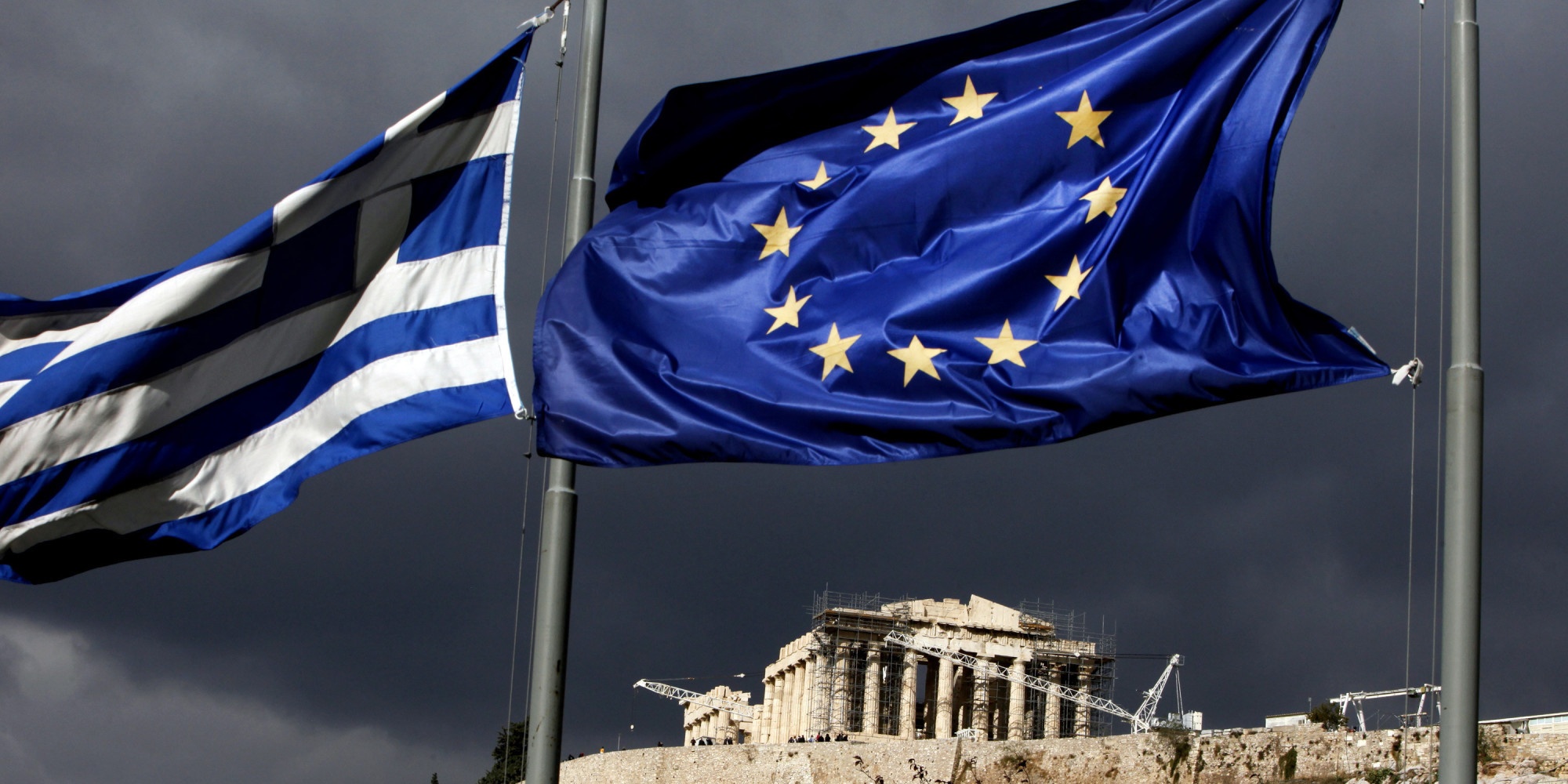
Last Monday, Eurozone finance ministers met to discuss the state of play in Greece and approve the next tranche of bailout cash.
With a row between Germany and the IMF impeding a successful conclusion of the talks, agreement was postponed until the next Eurogroup on June 15. In the meantime, Greece is once again faced with the risk of having to default on its debt, the next repayment of which is due in July.
If that all sounds familiar, it is because Greece has been stuck in the same circle of emergency Eurogroup meetings and looming debt repayments for years. This piecemeal provision of liquidity in the form of Eurozone bailouts has failed to conclusively resolve the crisis, indicating that the issue lies elsewhere. The Greek government isn’t blameless in that regard, as it has consistently failed to implement some necessary reforms, while making only slow progress with others.
At the same time, however, it is becoming increasingly apparent that the problem is not about servicing the debt in the short term, but rather about the absolute amount of debt owed in the first place. The Eurozone has persistently failed to acknowledge and address the unsustainability of the Greek debt, as its taxpayer-backed bailout mechanisms would make any substantial debt relief politically poisonous. In this light, it is worth examining how the conflict between Greece’s economic problem and the Eurozone’s institutional structures plays out:
The IMF
Throughout the successive Eurogroup meetings, the IMF has been arguing in favour of debt relief measures, deeming the country’s debt to be unsustainable. Specifically, it has refused to participate in the current bailout programme unless the Eurozone approves sufficient debt relief. In a statement released in September 2016, the IMF said, “Further debt relief will be required to restore sustainability… and it should be calibrated on realistic assumptions about Greece’s ability to generate sustained surpluses and long-term growth.”According to minutes of the Eurogroup leaked to Euro2day, the Director of the IMF’s European Department Poul Thomsen reiterated that point on Monday, saying, “[the IMF] would need something considerably more specific [on debt relief] or you will not be able to get us to agree on this. We can live with the avoidance of haircuts and fiscal transfers but that means extensions of maturities not only for [loans from the European Financial Stability Facility] EFSF but also two other European facilities.”
The IMF’s position on the necessity of debt relief stems from its pessimistic forecast for the long-term growth of the Greek economy, which it expects to expand by only 1% of the GDP (Figure 1). Similarly, the country’s primary surplus (i.e. its budget surplus before payment of interests on government debt) is projected at 1.5% of the GDP, which means that the debt-to-GDP ratio would reach 226% in 2060, up from the already astronomical 179% in 2016. These projections come in stark contrast with those of the Eurozone, which expects the Greek economy to grow at 1.3% of GDP in the long term, with its primary surplus remaining on average at 2.6%. That would bring its debt down to under 60% in 2060. The former scenario necessitates a generous restructuring of the debt for it to become sustainable, while the latter requires no debt relief.

The Eurozone
It is in the markedly differing growth projections of the IMF and the Eurozone that the significance of their different structures first becomes apparent. Unlike the IMF, the Eurozone is made up of 19 states with their own governments, electorates and national mandates. To make matters more complicated, these 19 states are the ones carrying the vast majority of Greece’s public debt (Figure 2), which exposes their taxpayers to any major decisions taken by the Eurozone in support of the Greek economy. Granting Greece relief from a debt owed to those same taxpayers would only serve to exasperate them, at a time when many of them are deciding how to vote in their upcoming national elections (e.g. Germany, Austria).
As Greece’s biggest creditor, it is not surprising that Germany has raised significant resistance to the IMF’s insistence on debt relief. Its government faces an election in September, and is therefore reluctant to adopt any measures that imply heavy costs for its taxpayers. At the same time, the German Bundestag sees IMF participation as a sine qua non for its own continued participation in the Greek bailouts. According to the leaked Eurogroup minutes, German Finance Minister Wolfgang Schäuble appears to have said at Monday’s meeting, “Participation of [the] IMF has been a constitutional part of the programme always [sic] and without that, I would have to negotiate a new programme [with the Bundestag], and that would fail.” Instead, Germany is intent on keeping any debt relief negotiations strictly within the government’s existing mandate, as acquired after the Eurogroup agreement of May 2016. That mandate imposed some limits on the consideration of debt relief and Greece’s required fiscal trajectory, notably by excluding the possibility of nominal haircuts (i.e. a reduction in the absolute value of debt owed) and subjecting Greece to an upper limit for its deficit at 3% of the GDP after the end of its programme.
According to the leaked minutes, the German concerns about sticking to the existing mandate are shared by a number of member-states. Notably Dutch Finance Minister and President of the Eurogroup Jeroen Dijsselbloem appears to have ruled out the possibility of the Dutch parliament approving a new deal for Greece at this point. France’s Finance Minister Bruno Le Maire also expressed concerns over the IMF’s proposals for debt relief, especially in terms of extending debt maturities, despite his overall willingness to reach a compromise on the issue.

The Greek position
Within the Eurozone, the 18 national mandates of the creditors also come in conflict with the commitments of the Greek government to its electorate and Parliament. According to the leaks, it was at the request of Greek Prime Minister Alexis Tsipras that Finance Minister Euclid Tsakalotos rejected a proposal tabled by Germany at the Eurogroup. This plan, which was first negotiated by the IMF and Schäuble on the sidelines of the meeting, would allow the IMF to agree to the Greek bailout “in principle” without financially contributing to the next disbursement and participate in its financing at a later date. That would likely be at the end of the current programme in August 2018, when the Eurozone has expressed willingness to discuss specific debt relief measures, if deemed necessary.
This proposal is likely to come back to the table at the next Eurogroup on June 15 and remains highly plausible because of the time-sensitive nature of the issue. In addition, it can enable the Greek government to deliver on the promises it made to the Parliament when putting forward the tough reforms required by the bailout: that Greece would start borrowing from the financial markets after the end of the current programme, and that the European Central Bank (ECB) would include Greece in its Quantitative Easing (QE) programme. According to ECB President Mario Draghi, the latter is again dependent on IMF participation in the bailout. Since the Eurogroup, the Greek PM has appeared more willing to compromise on the German proposal, saying that the government’s strategic goals “can be achieved either with a deal about the debt like the one presented by the German Finance Minister, or with an even better one that we are trying to achieve.” However, it remains unclear whether the other member-states would welcome the plan, as the leaked minutes suggest that Spain was sceptical, suggesting that the IMF take on an advisory role in the bailout instead of being ‘half-in, half-out.’
What will happen next?
At the next Eurogroup, time pressure will determine the outcome: with the IMF and Germany unlikely to reach a more favourable agreement in time for the disbursement, compromise might be the only option left if Greece wants to avoid default.
However, immediately after this issue is resolved, the creditors will need to approve debt relief measures for Greece. After years of the same piecemeal approach to the crisis, it has become clear to (almost) everyone that the country’s debt is not sustainable. In addition to improving Greece’s economic outlook, debt relief would ease the significant burden that this crisis has been imposing on the Eurozone member-states, by sharing it with the IMF. Combined with the expected participation in the ECB’s QE programme, debt relief could boost the confidence of bond markets in the long-term prospects of the economy, making it more likely for Greece to successfully serve its financing needs from the markets instead of costly Eurozone bailouts after August 2018. In this sense, disentangling the Greek crisis from the complex Eurozone structures could eventually benefit both sides, putting an end to the deadlock created by the Eurozone’s institutional contradiction between its members’ professed solidarity and their domestic interests.
Beyond the immediate issues facing the Greek economy, however, this debate serves as a proxy for a wider discussion about the shortcomings of the Eurozone’s structures, centred on issues such as the need for fiscal transfers – a topic that remains too contentious to touch in a number of Eurozone countries.



